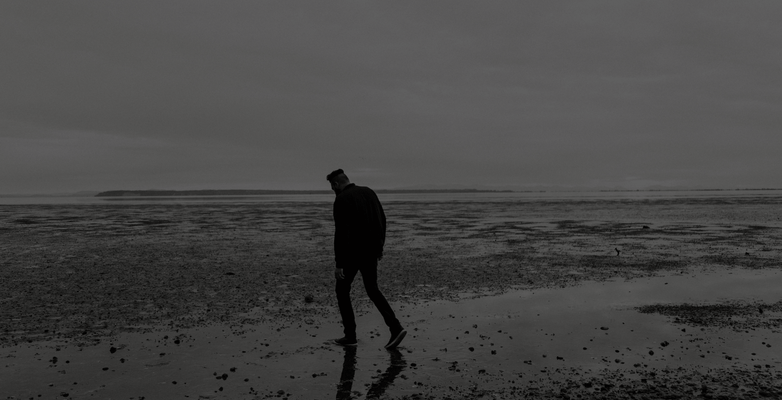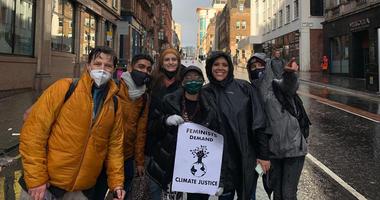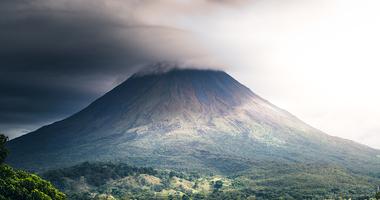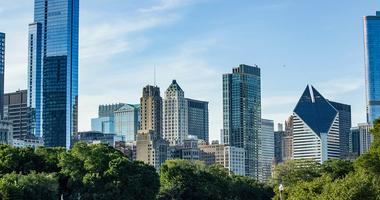
Ecological Anxiety: An Occupational Hazard in the Climate Movement
As Mental Health Awareness Month comes to a close, I wanted to offer words of encouragement and kindness to all those out there dealing with eco-anxiety, and perhaps particularly those with existing mental health diagnoses that amplify it.
I don’t have to tell anyone here that 2022 has already been… something.
The COVID-19 pandemic continues to upend lives and livelihoods around the world. The Russian assault on Ukraine has created a refugee crisis that has displaced millions. Rising inflation and key food shortages are leaving many families with less and less buying power and fewer places to turn. Long-established rights and progress are being dismantled. And now, there’s also monkeypox to watch out for.
At the same time, the climate crisis has continued to do the thing it does best: make everything worse.
The devastating heat wave that gripped India and Pakistan earlier this year and took 90 lives with it was made 30 times more likely because of the crisis. Wildfire season in the American Southwest seems to have become a nearly year-round event. In parts of Africa, the worst drought in 40 years has exacerbated a food security emergency that has plunged millions into extreme hunger. In the US, reservoirs depended on by tens of millions of people are at historically low levels.
There’s also the coming 2022 Atlantic hurricane season, which is already being predicted to be busier than normal thanks to, among other factors, higher-than-average ocean temperatures, marking the seventh consecutive above-average hurricane season.
It’s a lot. And not all of us are able to deal with it the same as others.
We know the physical impacts of climate change are devastating. Manmade pollution from fossil fuels has increased the likelihood of extreme and severe weather like hurricanes, droughts, and heat waves. It’s poisoning our neighborhoods, disproportionately those of low-income families and communities of color. Climate change endangers our ability to grow crops and the security of our drinking water. It’s a threat to our basic infrastructure and to vital institutions like hospitals and schools.
It’s a list that could go on and on.
But the dangers of the climate crisis don't stop there. Climate change can profoundly impact our mental health, creating or exacerbating everything from anxiety and depression to post-traumatic stress.
There are significant psychological costs for those who are affected by climate-related disasters. But you don’t have to directly experience a climate change-worsened natural disaster to experience the mental health effects of this crisis.
The American Psychological Association even has terminology for the difference.
“Climate change has acute and chronic impacts, directly and indirectly, on individual well-being,” the APA writes. “Acute impacts result from natural disasters or extreme weather events. Chronic impacts result from longer-term changes in climate,” including the distress of witnessing others experiencing the impacts of the crisis and feeling powerless to stop it.
In the end, whether acute or chronic, there’s a term for what we’re talking about here. Climate or eco-anxiety is described by the APA as “a chronic fear of environmental doom.”
It goes on to add, “The ability to process information and make decisions without being disabled by extreme emotional responses is threatened by climate change. … Climate-related stress is likely to lead to increases in stress-related problems, such as substance abuse, anxiety disorders, and depression. These problems often carry economic costs incurred by lost workdays, increased use of medical services, etc., which, in turn, create additional stress for individuals and society and have their own impacts on mental and physical health.”
Tell me about it.
Earlier this year, after nearly six years of working to inform and educate advocates both new and experienced in the fight against this crisis as the content writer and editor here at Climate Reality, I slammed head-first into the wall that is chronic eco-anxiety. It wasn’t a pretty sight.
Here, for the sake of transparency, I should add that I have an existing primary mental health diagnosis.
I’m going to go out on a limb and say I’m not the only one reading this who has one, either.
Mine is obsessive-compulsive disorder (OCD), and boy oh boy, does it rise far above the television depictions of very clean spaces, superstitious ticks, and checking repeatedly to make sure things are turned off (well, that one is true, at least for me; I’ve been at war with the stove or the sink since about 2011).
But the real issue for me – and where it overlaps and begins to spiral out together with eco-anxiety – are the uncontrollable recurring thoughts that inform OCD.
You can’t have OCD and write for years on end about how agricultural products are becoming harder and harder to grow in many places without it leading you straight to the logical worst-case scenarios: rising prices, famine, displacement, conflict, migration.
Fear and panic take over and it gets messy.
In what I’ve since learned was something of a trauma-response effort to protect myself from further panic – and literal panic attacks – about things that felt out of my control, I began to, well, not deal with them at all. I found myself dissociating from my real life and my real responsibilities, choosing instead to disappear into what some researchers call “maladaptive daydreams.”
“Maladaptive daydreaming describes a condition where a person regularly experiences daydreams that are intense and highly distracting — so distracting, in fact, that the person may stop engaging with the task or people in front of them,” according to the Sleep Foundation. “[Maladaptive daydreamers] may become so absorbed with their inner world that it becomes harder to ground themselves in reality.”
What separates maladaptive daydreaming (MD) from other mental health conditions that involve dissociation – from dissociative identity disorder to schizophrenia – is that those experiencing MD are aware of it. Maladaptive daydreamers know that their episodes are not real life.
For what it’s worth, this does not make the experience any less emotionally distressing. Quite the opposite: knowing you are doing something means you should be able to control it, and when you can’t, well, you start to feel even more powerless.
Rather than deal with real life, I was content to disappear into a false one. By late March of this year, it had reached a crisis point and I knew I had to do something.
I needed time, which I was lucky enough to be afforded by an understanding employer. I needed to go outside and be reminded what I was fighting for, which I was lucky enough to be able to do as well. But mostly I needed professional help, which I was able to get because I’m lucky enough to have good health insurance.
Not everyone has those things. That causes me despair too, and I hope we move forward together as a society toward a place where proper care isn’t rationed or optional or dependent on the compassion of others but instead compulsory and available to all. But here we are – and no matter our individual circumstances, the fact that the future of the planet is on the line is very real, and very scary.
It can be terribly tempting to run and hide. To disappear into more-comforting disassociations. To unfollow news outlets. To skip past documentaries. To pretend everything is OK.
But it’s not – and that’s sort of the point.
So, as Mental Health Awareness Month comes to a close, I wanted to offer words of encouragement and kindness to all those out there dealing with eco-anxiety, and perhaps particularly those with existing mental health diagnoses that amplify it.
Confront and Talk About It, Perhaps with a Pro
Discussions about mental health can be… weird. Uncomfortable. Revealing.
They can leave you feeling vulnerable.
But in my experience, the alternative can be far worse. After all, you first have to acknowledge your feelings to determine the level of help you need and the best ways to take care of yourself. (Can you tell I’ve been seeing a therapist?)
The APA highly recommends connection – to family, to friends, to other social networks – as a coping mechanism.
“During difficult times, people turn to those they are close to, such as family, friends, and neighbors, for emotional support, as well as material help (e.g., money, food, or a temporary place to stay). Resilience scholars note that social support is a critical protective resource during adversity,” the APA writes. “Researchers have found that higher levels of social support during and in the aftermath of a disaster are associated with lower rates of psychological distress.”
For those feeling lost or helpless, do not hesitate to seek out the professional help you need.
If you are able and have the resources, a counselor or psychiatric professional can help you weather the storm. In many places, support groups exist – or can be created! – to help persons dealing with emotional distress related to climate change.
Several of these peer support groups can even be accessed for free online.
Take Action
Having read the above, I can understand how this suggestion might seem a tad off base – after all, didn’t “taking action” complicate my own mental health and eco-anxiety?
Perhaps it did. But here I am, still scribbling away in hopes that the right content will reach the right person and change their mind or teach them something new or convince them to make moves of their own to support a more sustainable future for all.
The lesson I took from my own experience wasn’t to run and hide from this crisis forever. It was to know when too much was too much and when I needed to back off and slow my roll – so I could return as the most effective advocate I could be.
Feeling like you are doing something, anything, real to take on the very thing that scares you the most has its rewards. Facing our fears can be incredibly difficult. But it can add to our strength too; make us more resilient.
Remember, though, that you can only do what you can when you can. That’s true for most things. But you also need to embrace the idea that that is enough – and never let anyone tell you anything different.
The climate crisis can be incredibly overwhelming. There is no one path to solving it. Sharing a key petition or the link to an open comment period and then putting the phone or computer away is a big way to help create the change you want to see.
All of which is to say, when I say, “take action,” I’m not suggesting you have to live on a picket line or attend every march. Indeed, one of the most important actions you can take is to simply talk about the crisis with your friends, family, and other networks.
You don’t have to leave your kitchen table to take climate action. Just remember to do something for yourself afterward. You’re no good to anyone, particularly yourself, if you’re not taking care of you.
And of course, “take action” can to some extent also simply mean “live your values.” Changes like recycling, reducing food waste, and taking public transit when possible are all easy steps you can take to create change in your community without adding to your eco-anxiety.
I share my own story here mostly as a reminder of a few things. That we’re in this together. That it’s OK to not be OK sometimes. That your feelings and worries are valid. That help is there if you need it.
And that if anyone tries to make you feel less-than because you are having trouble coping with the greatest threat our planet has ever faced, they don’t deserve you.
---
If you are feeling truly lost, afraid, or like you might harm yourself as a means of coping, please, please reach out to the National Suicide Prevention Lifeline at 1-800-273-8255 or a local intervention organization in your community.
We are going to win the fight against the climate crisis – and trust me, you’re going to want to be here, happy and healthy, when the sun rises on that beautiful day.




